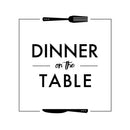Family wellbeing
 I want you to think back to what you did this morning, from the time when you first woke up. Did you drink a cup of tea? Sit and read the paper? Catch up on emails? Dress and feed children? Chase the bin truck down the street, because, curses, if you don't catch it there's going to be a hell of a problem by Sunday?
I want you to think back to what you did this morning, from the time when you first woke up. Did you drink a cup of tea? Sit and read the paper? Catch up on emails? Dress and feed children? Chase the bin truck down the street, because, curses, if you don't catch it there's going to be a hell of a problem by Sunday?
How you spent your morning was influenced by the demands on your time and how much time you had available: for instance, you always get up early enough to iron your shirt just before you put it on. Your morning was shaped by your goals, values and beliefs: breakfast is to be eaten at all costs, preferably seated and in several courses vs. breakfast equals coffee in the travel mug sitting in the traffic.
You had to balance your needs against those you share your abode with: I would happily sit with a cuppa having a chat with the senior recipe tester. Others with whom I share my life seem incapable of independently finding their shoes. For most of us, there is some level of predictability about how the morning will go: this is why the overnight blackout which causes the alarm to fail takes until lunchtime to get over.
We actively create daily routines that we can live with. Not routine in the sense that everything has to happen in exactly the same way at the same time each day. But we thrive with a general rhythm to our daily lives with which meets our goals and expectations. When life throws us a curve ball, we find the resources (time, money, support, whatever!) to manage it in the way that's right for us, or we can succumb to despair.
It's the same when it comes to dinner: at the table, infront of the telly, in the car on the way to somewhere else, together, separately, in, out, ring-up-and-order-something-I-can't-do-another-thing... All these decisions are both active, and influenced by our circumstances and values.
So, does having dinner done for you mean you can make the day to day fit a little easier? You tell us! (Please do comment below, and let us know what you think!). What do you do with the extra time? Or what would you do if you had dinner prep time at your disposal?
We're committed to gifting dinner to a number of our customers, all of whom are living with disability. Sometimes, disability means the resources are stretched thinner. Sometimes it means less predictability in the day-to-day. Whether your dinner is purchased or gifted it increases the amount of time at your disposal, it meets the needs of everyone in your household; it's meaningful: we all have to eat! And it offers some predictability about where the next meal is coming from.
One of our customers, to whom we gift meals, includes a note with her order almost every week. One read: "Thank you for making my life a little easier and much happier, every week!"
Good enough for us. Stay tuned, this year we're working with the University of Sydney to find out more.
Tags:
changedailylives,
delivered,
dinner,
disability,
family wellbeing,
meals,
research,
socent,
Sydney
Other articles:
Quick links
Home Home Delivery Meals How it works Meal Delivery Info Contact us Blog Search About us Privacy policy Karen Will Cater
Contact us
About us
We exist to care for you through really good food. Whether it's your weeknight family meal, your big life celebrations or your large corporate events, we'd love to cook for you.
And together, we can change the daily lives of families living with disability. Find out about our social mission here.
